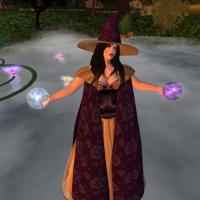-
Mastery of Words

The word wizard is of Germanic origin, but wizardry is a facet of a great many magickal traditions. Before science as we know it, there was a branch of study called natural philosophy. Natural philosophy was the idea that insight into the ultimate nature of reality could be gained by studying nature. Natural philosophy had…
-
Enchantment

There are some perceptual quirks that people learned to exploit even way back, but it wasn’t all about generating perceptual and conceptual illusions. Wizards had the art of consciously generating their own perceptual filters. This practice took the form of chants or rhymes. The chant served as a focusing aid so their mind would naturally pick out…
-
You and Your Daemon

Wizards had an idea of archetypes? They did indeed. These were what inspired the ancient pictographs, runes and things like that. They used what may have been a stronger trait of people back then, but I think it still applies even today. Anyone familiar with the bicameral mind model? It’s been proven that both hemispheres…
-
Spin to the World

Let’s go into the written word, specifically things like the runes and talismans. They were written concepts, though in the case of some talismans, the concept was extremely abstract like a depiction of a star constellation for the system of meridians in the human body. We engage in what are called neologisms even today. The…
-
Wizards vs Shamans

Any specific culture of wizardry you might like to focus on? I’d like to hear, at some point, about modern day wizardry. Well, modern day wizardry would perhaps be its own class, but the Wu-jen of China, the Skalds of Norse culture, and the Aboriginal Song Line Walkers of Australia would all be wizards. Though…
-
Modern Wizardry

Today we are talking about modern wizardry, but people wouldn’t recognize it as wizardry at first glance. What we know as science got its origin from the practices of ancient wizardry, and though it has made every attempt to eschew the subjective aspects of the previous disciplines, it seems this is ultimately impossible. What do…
-
Missing from the Scientific Community

Most scientists couldn’t lay genuine claim to any measure of the wisdom one might associate with the ancient wizards. Like the ancient priest divining the will of their deity from the guts of a ritual sacrifice, they tear apart the flesh of the living world and claim they can divine “reality” from it. What reality…
-
Examination of the Material World

The topic of Metascience is not meant to be an anti-science rant. I personally am not against the study or practice of science. When science was still a branch of philosophy, it was undertaken to give humanity more insight into the world, more ability to understand and thus adapt to how nature works. There is…
Category: Wizardry
Wizards were the keepers of stories. They had mastery of words. The ancient wizards found words for things and could appear to bring things into reality, because by their description they gave other people a way of looking at or understanding something that they might just ignore or avoid. They had what seemed like a mysterious ability to anticipate outcomes of events. They could even seem to be able to read people’s minds just based on things they said and didn’t say, as well as on how exactly they sounded when they said it. We engage in what are called neologisms even today. The creation of new words. But wizards both worked with the most primal languages and sought out new words and songs in that deep realm of consciousness that many are out of touch with today.
Today, we have a modern wizardry. Science got its origin from the practices of ancient wizardry. Discovery is a good thing, so is invention, but there is something missing, something vital. The thing that is missing from the scientific community as a consensus, though not from all students of science, is the simple willingness to remain grounded in human experience to explore the question of why. Would a science informed by metaphysical thought really derail itself? Would all progress really honestly cease?
“Do not meddle in the affairs of Wizards, for they are subtle and quick to anger.” J.R.R. Tolkien (English Writer and Author of The Lord of the Rings, 1892-1973)
“In a way, we are magicians. We are alchemists, sorcerers and wizards. We are a very strange bunch. But there is great fun in being a wizard.” Billy Joel

